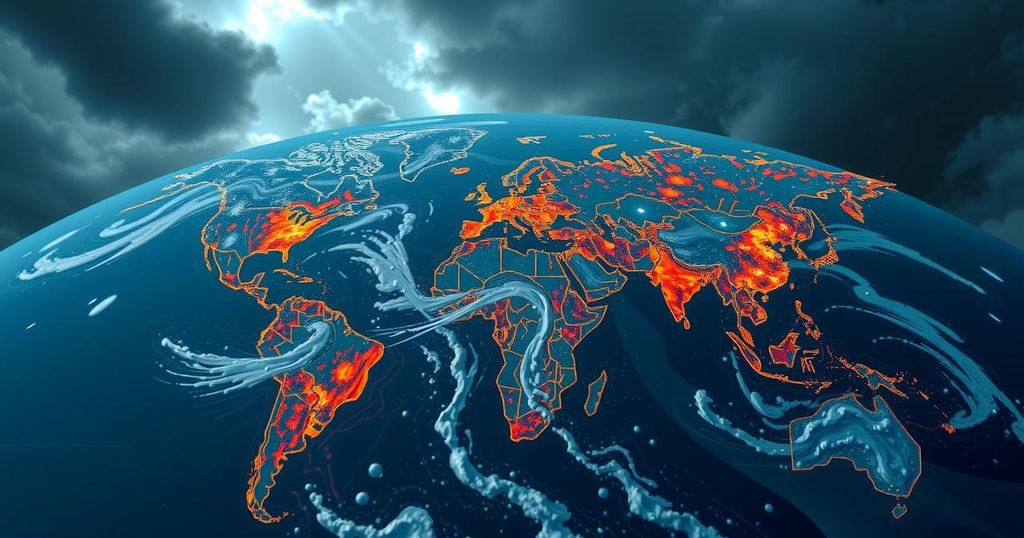Understanding the Relationship Between Climate Crisis and Extreme Weather Events

Scientific studies have established a clear link between the climate crisis and extreme weather events. Climate attribution employs various methods to assess the impact of global warming on the frequency and severity of such events. The findings reveal that many heatwaves, floods, and droughts have been significantly worsened by human-induced climate change, supporting the need for urgent action against the climate crisis.
The question of whether the climate crisis is directly responsible for the increasing frequency and severity of extreme weather events is critical yet complex. Climate attribution is a scientific process that effectively deconstructs this query, revealing a clear connection between human-induced climate change and the unprecedented weather patterns observed today. Recent studies have demonstrated that fossil fuel emissions have altered climatic conditions significantly, resulting in severe heatwaves, floods, and storms that have become commonplace in the modern era. Climate attribution employs three main approaches to achieve reliable assessments: By contrasting current weather data with historical climates, utilizing climate models to compare modern conditions against preindustrial eras, and simulating climate trends over extended periods to identify shifts in extreme weather likelihood. The studies conducted reveal alarming evidence of extreme heatwaves that are now unavoidable consequences of global warming, with at least 24 heatwaves documented to have occurred without historical precedent or models reflecting such phenomena absent human-induced climate change. In addition to heatwaves, various extreme weather events—including floods and droughts—exhibit significant influences from global heating. Among the 744 attribution studies compiled, over 75% indicated a considerable impact of climate change on extreme weather occurrences. Heatwaves have been particularly scrutinized, with 95% of analyses affirming an increased likelihood or severity, whereas floods show more complex results, with over 60% of rainfall and flooding assessments affirming deterioration due to climate changes. Moreover, attribution studies now seek to estimate death tolls attributed to extreme weather. Research indicates that climate change exacerbates the effects of these calamities, marking a critical need for data-driven responses to protect vulnerable communities. Notably, findings suggest that global heating contributed to substantial death tolls, with one study linking a significant proportion of heat-related infant deaths to climate change. Changes in weather patterns such as increased precipitation and milder freezing conditions further highlight the pervasive impact of climate change. Attribution studies are not only essential for understanding extreme weather but are also being utilized in legal contexts to hold polluters accountable for climate damages. Despite the limited number of events analyzed, substantial research has been completed to draw confident conclusions about extreme weather phenomena. Attribution science is increasingly acknowledged in discussions surrounding the UN’s loss and damage fund, which aims to support communities post-climate disasters. As research in this field progresses, the reality of a climate crisis leading to profound effects on weather patterns becomes increasingly undeniable. The ongoing studies will surely provide a deeper understanding of how global warming has altered our climate and lives irretrievably, emphasizing that the climate crisis is not a distant threat but an immediate reality affecting communities worldwide.
The climate crisis, largely driven by the burning of fossil fuels, has resulted in significant changes to the Earth’s climate. This has led to an increase in the frequency and severity of extreme weather events. Understanding the linkage between climate change and weather phenomena is vital for both scientific inquiry and inform policy responses. The process of climate attribution serves as a fundamental tool in examining these connections, yielding essential information to predict future patterns and necessitating the implementation of strategies to mitigate climate impacts and protect vulnerable populations.
The evidence from multiple attribution studies illustrates a definitive link between the climate crisis and the increasing severity of extreme weather events. The findings indicate that heatwaves and various extreme weather incidents are exacerbated significantly by the effects of global heating. It is crucial to acknowledge the ongoing research in attribution science, as it informs both public awareness and policy development regarding climate change accountability and mitigation strategies. The implications of these studies underscore the pressing need to address climate change as an immediate challenge that is currently affecting communities around the globe.
Original Source: www.theguardian.com






